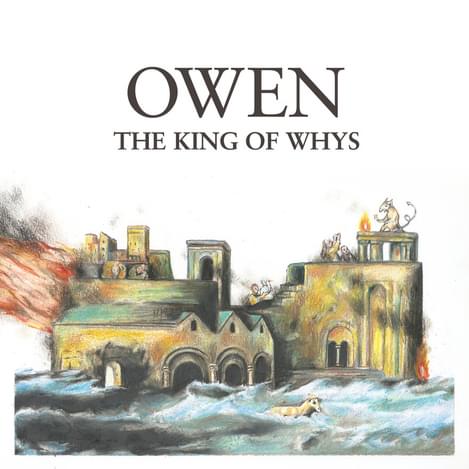Mike Kinsella is the King of Whys and the master of melancholy on the richest Owen record yet
"The King of Whys"

That his first band ever got back together at all seems like a total aberration; they were initially a flash in the pan during Kinsella’s university days in Champaign, Illinois, playing most of their shows on college campuses and at house parties. Their one full-length nearly didn’t get made, with only a last-ditch offer from a friend at the then-fledgling Polyvinyl convincing Kinsella, guitarist Steve Holmes and drummer Steve Lamos to lay down nine tracks just before they graduated and closed the book on that chapter of their lives; Kinsella had to come up with a large chunk of the lyrics at the eleventh hour, having only ever played some of the songs as instrumentals.
Kinsella was the only one of the three to go on to pursue a career as a musician full-time, playing in Cap’n Jazz, Joan of Arc, Owls and Their/They’re/There amongst others, often alongside brother Tim and cousin Nate. The Kinsellas, whether they like it or not, are the first family of emo, as long as we understand emo to represent emotionally-literate songwriting that sonically can run the gamut from delicate acoustic to post-hardcore. Kinsella’s main musical focus since American Football, his solo project Owen, has always been planted firmly towards the former end of the spectrum - often lo-fi, often home-recorded, always imbued with a sense of catharsis and emotional release.
Something about this new Owen record feels like a departure, though. The King of Whys is the first album under this moniker that Kinsella has made outside of his native Chicago. The production values feel higher than they ever have; Bon Iver affiliate S. Carey handled duties behind the desk at Justin Vernon’s April Base studio in Fall Creek, Wisconsin last winter. It’d be a stretch to suggest that there was polish here, but Carey has certainly found a way of bringing out the warmth in Kinsella’s vocals in a way that matches the richness of the instrumentation. Opener “Empty Bottle” sets the tone in that respect; the guitars clang and the drums thump and yet, as much as this is clearly indicative of a bolder, more forceful Owen sound, Kinsella’s vocals do a lovely job of smoothing things out. He came in for occasional criticism over the course of the American Football tour last year, his voice having transformed in the sixteen years since their album was cut, but all he’s actually done is grow into it; his vocals are pleasantly weathered, a touch rougher than before but, crucially, replete with character as a result.
And it’s those American Football shows, you suspect, that have led Kinsella out of his comfort zone here; playing on bigger stages than ever before, from New York’s Webster Hall to the NME tent at Reading and Leeds. On parts of The King of Whys, the influence is subtle; the swell of brass and the fluttering of strings on “The Desperate”, the rolling percussion that washes over “Lovers Come and Go”, the swirl of backing vocals towards the end of “Sleep Is a Myth”. Elsewhere, you hear his old band drift through a little more clearly - those intricate guitar lines on “Settled Down”, or the intermittent, off-kilter drums on “Tourniquet”. Throughout, the unifying characteristic is the richness and warmth of the sound, a million miles from the lo-fi of old; this is the prettiest Owen record to date, and there’s no shortage of strong contenders for that particular title.
If there’s an elephant in the room, though, it’s the issue of what exactly Kinsella writes about at this point in his life; for a start, his presence on social media does not suggest that he’s a man unduly burdened with the emotional turmoil of old. As well as being consistently very funny on Twitter, his Instagram account presents him as a picture of domesticity; his love of his wife, two young kids, pizza and beer are the common denominators from photo to photo. I’ve interviewed Kinsella twice; the first time, he broke off from an afternoon of doing laundry to take the call, and the second, he’d just done the school run. This is no longer a songwriter dealing with failed relationship basics; on this record, he’s delving instead into the nuances of age and family. “A Burning Soul” is perhaps the best example, an account of his father’s alcoholism that is considerably more sympathetic than it would have been ten years ago, maturity having mellowed his anger. The tracks directed towards his young family, meanwhile, tend to be scored through with equal parts dry wit and genuine affection.
All of which is to say that just because Kinsella has found emotional balance doesn’t mean he can’t continue to make emotional records. Like his brother, he’s long been reticent about the emo label, and the far-from-brief press release for The King of Whys doesn’t use that particular word once. Perhaps he feels that it sounds a touch childish now that he’s on the approach to middle age; if the king of emo is dead, then, long live Mike Kinsella, master of melancholy.
Get the Best Fit take on the week in music direct to your inbox every Friday

Lorde
Virgin

OSKA
Refined Believer

Tropical F*ck Storm
Fairyland Codex





